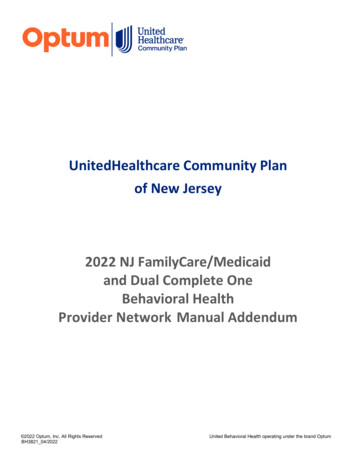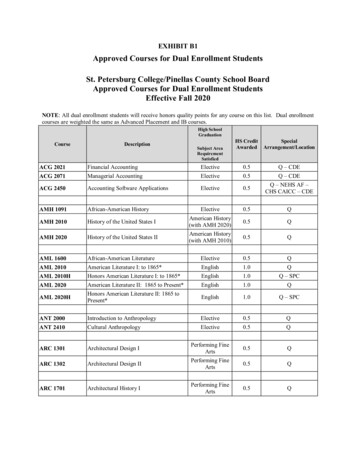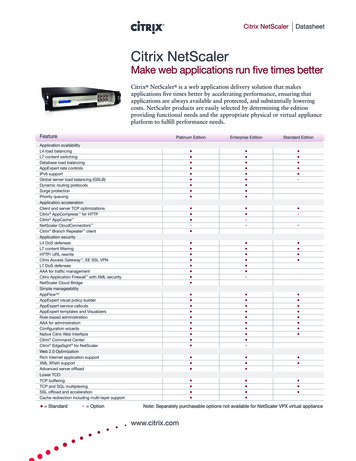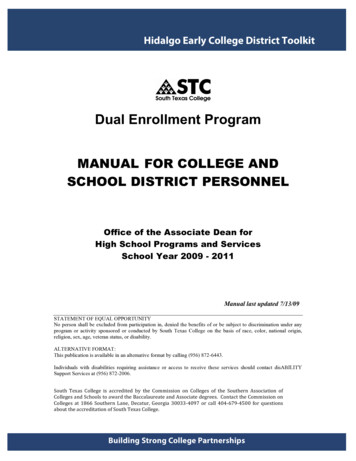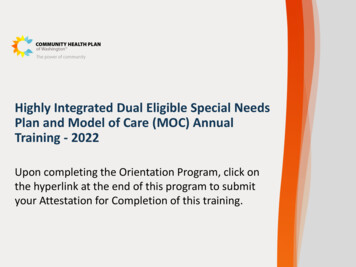
Transcription
Highly Integrated Dual Eligible Special NeedsPlan and Model of Care (MOC) AnnualTraining - 2022Upon completing the Orientation Program, click onthe hyperlink at the end of this program to submityour Attestation for Completion of this training.
CMS Training RequirementsThe Centers for Medicare & Medicaid Services (CMS) requires allCHPW medical providers and staff receive training about the HighlyIntegrated Dual Eligible Special Needs Plan Model of Care.This training and completion of an attestation are required of allnew staff, and of all established staff annually.We will refer to this going forward as D-SNP, or the D-SNP Model ofCare.
Purpose of this Training Knowledge of the D-SNP Model of Care Understandthe social determinants of health affectingmembers enrolled in D-SNP Explain how CHPW Case Management and our networkProviders administer D-SNP Comply with CMS requirements.All employees,providers, and contractors must take this training.
CHPW’s MissionOur mission is to deliver accessiblemanaged care services that meet theneeds and improve the health of ourcommunities and make managed careparticipation beneficial for communityresponsive providers.We work for patients, and we work tohelp providers better serve thosepatients.
CHPW’s VisionThe vision of Community Health Plan of Washington (CHPW) is to enhanceaccess to patient-centered care in a fiscally responsible manner while assuringthat all efforts amplify the community health center mission. We meet thischallenge by identifying and addressing needs that impact the health of ourmembers, both within the clinical setting and beyond.With our mission and vision as our focus and guide, CHPW partners with ournetwork providers to provide holistic support for our most vulnerable members.One way that we do this is through the D-SNP Model of Care.
History of D-SNPA type of Medicare Advantage PlanSpecial Needs Plans (SNPs) were created by Congress in 2003 as part of the MedicareModernization Act. SNPs are a type of Medicare Advantage (MA) plan that limitsmembership to people with specific diseases or characteristics.SNPs may target one of three populations: Chronic Condition, Institutionalized, or DualEligible.CHPW covers dual Eligible individuals. dual-Eligible SNPs, or D-SNPs, enroll onlyindividuals who are dual-eligible for Medicare and Medicaid.
CHPW D-SNPFully dual eligible for Medicare and MedicaidQualified Medicare beneficiary only (QMB)Categorically Needy Program (CNP)To be Eligible Membersmust be in one of thesecategories to participatein CHPW’s D-SNPprogramLimited Casualty Program Medical Needy Program (LCP-MNP)Partially dual-eligibleSpecific low-income Medicare beneficiary (SLIMB)Qualified individual program (QI)Qualified disabled working individual (QDWI)
Social Determinants of Health (SDoH)“The social determinantsof health are theconditions in whichpeople are born, grow,live, work and age.” – TheWorld HealthOrganization (WHO)Social Determinants of Health include aspects of a person’s environment that directlyimpact their overall well-being, such as lack of housing, food insecurity, unreliable orunavailable transportation, unsafe surroundings, and insufficient access to education.
Many of CHPW D-SNP members are impactedby these Social Determinants of HealthSDoH FactorsInfluence Healthand Well Being by 20%Compared to HealthCare at 10%.Social Determinants of Health have a greater impact on health and well-being thanactual health care.
Overall Member Demographics6,635 Total D-SNPMembers as of March2021Average Age is 67Slightly more femalesthan males.Female: 59%Male: 41%
D-SNP Member DemographicsGeographically, the CHPW population of D-SNP members is located across WashingtonState, from rural, agricultural areas to urban centers. It’s expected that the urban countiesof King, Yakima, and Spokane have the most members. Where some counties have just 1or 2 members.This map displaysthe countydistribution as ofMarch 2021
Health Conditions Impacting D-SNP BeneficiariesChronic ConditionMember Count % of D-SNP MembersDiabetes with chronic complications1,97630%Major depressive, bipolar, andparanoid disorders1,43322%Chronic obstructive pulmonarydisease (COPD)1,17818%Data sourced from claims and supplemental data sources with a lookback of 24 months (CMS-HCC V24)
Behavioral Health Diagnoses forD-SNP High-Risk SubpopulationData sourced from claims and supplemental data sources with a lookback of 24 months (CMS-HCC V24)
A Collaboration Between Case Managersand Providers Specialized provider network Social Determinants of Health Annual Health Risk Assessment(HRA) Chronic Disease Management Additional Benefits at No Cost Medicare/Medicaid eCoordinationQualityImprovement Transitions of Care Individual Care Plan (ICT) Chronic care improvement program Interdisciplinary care team Quality Assurance improvementprogram
Special Health ServicesCase Managers and Providers work together to support the member’s whole-person wellbeing, including physical health, behavioral health, and social determinants of health. Specialized Provider NetworkAnnual Health Risk Assessment(HRA)Additional Benefits at NoCostSpecialHealth Services
D-SNP Care CoordinationCare Coordination Medicare/Medicaidcoordination Interdisciplinary CareTeam
Case Management Social Determinants of Health Chronic Disease Management Transitions of Care Management Individual Care Plan (ICP)Case ManagementAll D-SNP members are enrolled in Case Management. Members may opt out butremain assigned to a Case Manager
Individualized Care Plan (ICP)InterdisciplinaryCare Team (ICT)Health Risk Assessment(HRA)Individualized Care Plan(ICP)Case ManagementThis team, which has the member at the center, uses the Health Risk Assessment to create anIndividualized Care Plan, for the member.
D-SNP Quality Improvement ProgramD-SNP Data Includes: Quality ImprovementNCQA Health Care EffectivenessData and Information Set (HEDIS ) CMS Health Outcomes Survey (HOS) Chronic careimprovement Quality Assuranceimprovement CMS Consumer Assessment ofHealthcare Providers & Systems(CAHPs) measures NCQA Structure and Process StandardsHealth plans that administer a D-SNP are required by CMS to conduct and report a QualityImprovement Program (QIP) to monitor health outcomes and implementation of the MOC.This Quality Improvement Program has two aspects:- Chronic Care Improvement- Quality Assurance Improvement Program
CHPW D-SNP Contact InformationMedicare Advantage Customer ServicePlan ServedMedicare Advantage PlansReceive answers on thefollowing: Appeals & GrievancesClaims StatusEligibility VerificationGeneral InformationHospital NotificationsMember BenefitsPCP ChangesPrior AuthorizationStatusCase ManagementReferralsContact numbers: (800) 942-0247Customer Service(866) 418-7005D-SNP Case Management TTY/TDD Dial relay 7-1-1 (206) 652-7050Customer Service Faxcustomercare@chpw.orgCustomer Service caremgmtreferrals@chpw.orgCase Management Referrals
By completing this annual D-SNP Model of Care training,you have done your part to help CHPW maintaincompliance with CMS standards!Please Attest that you have completed the HighlyIntegrated Dual Eligible Special Needs Plan Model of CareTraining.ATTEST HERE
CMS Training Requirements The Centers for Medicare & Medicaid Services (CMS) requires all CHPW medical providers and staff receive training about the Highly Integrated Dual Eligible Special Needs Plan Model of Care. This training and completion of an attestation are required of all new staff, and of all established staff annually.


